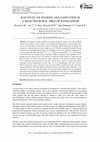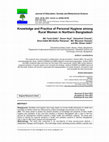Papers by Md. Monower Hossain

International Conference on Public Health, 2017
UN General Assembly explicitly recognized the human right to water and sanitation which is also e... more UN General Assembly explicitly recognized the human right to water and sanitation which is also essential to achieve target six of sustainable development goals. This descriptive type of cross sectional study was carried out to observe knowledge, attitude and practice on hygiene and sanitation in a selected rural area with a sample size of 247 which was purposively selected. The age structure of the respondents showed that 47.4% belonged to 34-48 years and43.3% belonged to 19-33 years' age group with mean age 35.53 ± 9.11. Among the respondents 78.1% were Muslim, 62.8% and 37.2% were female and male respectively. Study revealed that of the respondents 56.3% thought germ free water as safe, 11.7% opined it as smell free,14.2% replied it as both smell and germ free but 17.8% didn't know about it. About sanitation, 48.2% mentioned hygienic latrine, 11.3% mentioned clean environment and 28.3% did not know about it. Among them 49.0% respondents cleaned drinking glass by only water, 32.0% by soap/detergent with water. Of them 80.6% cleaned water storage container by only water and 13.8%by soap/detergent along with water. Among respondents 36.8% had under five children in family, 30.4% defecated in open place, 6.4% used latrine for defecation and 30.4% didn't use soap after bottom cleaning. There was significant association between education and knowledge on sanitation and safe water (p=< 0.001).Bangladesh Poverty Reduction Strategy has included water and sanitation as an important issue which has got due attention by stakeholders and international development organizations.

Journal of Education, Society and Behavioural Science, 2021
Background: Sanitation and hygiene have huge impact on human health particularly on death and mor... more Background: Sanitation and hygiene have huge impact on human health particularly on death and morbidity of children which are influenced by mother knowledge and practice on the issues. Aim: The study aimed to assess the present situation of knowledge and practices of basic health hygiene and sanitation of the rural farm families in Northern Bangladesh with a view to find the ground for development initiative towards a better health and sanitation systems. The study also aimed to identify the regional variations in health and sanitation systems in Northern Bangladesh with a view to offer policy support and development. Methodology: The study was conducted in six sub-districts of three poverty-prone districts – Gaibandha, Rangpur and Kurigram. The multi-stage cluster sampling process yielded a sample size of 386 household (HH) covering 24 different villages. Data was collected by trained assistants following a face-to-face interview using structured interview schedule. Descriptive sta...
Subject: Application for the position of "Project Coordinator".

Uploads
Papers by Md. Monower Hossain